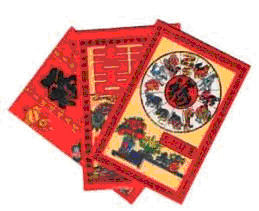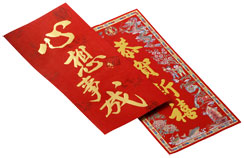Red envelopes – Ang Pow, laisee, lai see, red packets, hung bao or Hung-Bao
© 2013 Michael Hanna
Even though they are often referred to as red envelopes they are also coloured in a golden colour as red and gold to the Chinese are seen as very auspicious.Ang Pow red envelopes are also known as “Ang Pow” “red packets” “lai see” “laisee” “hung bao” or “hung-bao”. These envelopes are seen as very lucky when given as a gift and are seen as even more fortunate when they contain some money. The main use of red envelopes is for Chinese New Year, birthdays, weddings or any other important event.
The appearance on the front of an Ang Pow envelope represent blessings and good wishes of a long life, success, great wealth and good health to the recipient of the envelope.
Whenever you give money on a festive or auspicious occasion, you should never use a white envelope to put money in as a gift as you will face the unpleasantness of the giver. Money that is received when it is a gloomy occasion such as a funeral when somebody receives a gift of money to help cover funeral costs; this is called “Pak Kum” which is when money for the family of the departed is donated. So if you Chinese or southeast Asian friends or clients, think again before giving them their fee or money gift in a white envelope as this could offend them.
The story of Ang Pow red envelopes.
Ang pow envelopes date back to the Sung Dynasty in China. A village called Chang-Chieu was at the time, being terrorised by a huge demon. No one was capable of defeating it, not even their greatest warriors or statesmen. However, a young orphan, armed with a magical sword which he had inherited from his ancestors, fought the evil demon and eventually killed it. The villagers were triumphant and the elders presented the brave young man with a red envelope (more like a red pouch I would imagine) filled with money for his courage in saving them all from the demon. Since then, the ang pow has become a part of traditional Chinese customs.
How much money should you place inside the red envelope?
This all depends on your situation. If you are giving ang pow envelopes to children for Chinese New Year, age will be an important factor. The usual practice is that as you get older you usually tend to receive a bit more each year. For a 5 year old child, £2 GBP (about $4 USD) will be fine. The amount contained has to be in even numbers.
For example:
Two pounds, eight pounds, ten pounds or twenty pounds are all auspicious amounts.
Giving red packets to employees before the Chinese New Year is also very common. This can be either a gift or a bonus. It is also believed that when you present them with your gift, their good fortunes will come back to your company.
The number of coins or notes that are placed in the red envelope may take advantage of the Chinese homophones. For example: you can give a favourable amount ending with eight (8), this sounds like fortune in Chinese; or nine (9) which sounds like longevity. Four (4) is not a good number to give as it sounds like death. You should always make sure that you give money in even numbers because unlucky numbers are considered as inauspicious, although receiving a single Chinese i-ching coin in a red envelope is considered very fortunate and the reason why we give these away as a gift to our customers.
When should give out Ang Pow’s?
Even though the tradition of giving and receiving red envelopes is centuries old, it is still as popular as it ever has been especially now in the west! During Chinese New Year, they are given by married couples to small children, teenagers and unmarried adults. This year, Chinese New Year falls on the 31st January in 2014.
Ang Pow envelopes can be given at any time and do not just have to be given on a special occasion. They are considered very favourable and can be given at any time; it is recommended that you use some of the money to try and pay some debt off if you have any. You should always leave a small even amount of money inside the red envelope and place it in your purse, handbag or wallet.
It is traditional to give a ang pow envelope to parents when their baby celebrates their first month of life. The parents will, in return, issue to well wishers gifts like red dyed eggs (and nui), yellow rice (nasi kunyit) with curry chicken or bean cakes (ang ku). Money is usually given as a birthday gift for people of all age groups. The elderly also give gifts of money to their younger generation when they celebrate events like their 70th birthday for example.
© Michael Hanna – Feng Shui Store 2014
Please share our content with as many friends and family members as possible; if you do all you need to do is give us credit for our hard work and a link back to our website. Contact info@fengshuistore.co.uk for more details.













